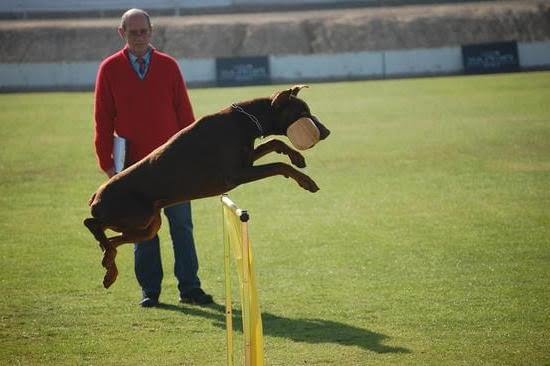Introduction
A career as a dog trainer is a rewarding one, offering the opportunity to form strong bonds with animals and their owners. People who are considering becoming a dog trainer should consider the various requirements before pursuing a job in this field.
Education Requirements: To become a certified dog trainer, individuals must typically complete a course of education approved by the Certification Council for Professional Dog Trainers. This includes completing theoretical and practical courses related to canine behavior, training principles and instructional methods. Some may opt for internships or working with an established dog trainer to expand their knowledge in practice.
Certification Requirements: After completing their educational coursework, aspiring dog trainers should pursue certifications from organizations like the Certification Council for Professional Dog Trainers (CCPDT). Holding certification demonstrates knowledge of safety when training dogs and is often necessary when seeking employment.
Other Requirements: Becoming a successful and respected dog trainer is more than just book learning; many skills like patience, problem-solving skills, communication techniques and flexibility are important components that allow trainers to become adaptable to ever-changing pet routines. As such, having prior work experience teaching adults and communicating with people of different backgrounds may provide additional helpful skills when applying for jobs in this field. Additionally, those who plan on having private enterprises need must obtain permits or business licenses from local officials in order to legally operate.
Prerequisite Skills
To become a dog trainer, you must have strong foundational skills in animal behavior and dog training techniques. Specifically, having experience with different training methods such as clicker, positive reinforcement, and various reward-based techniques. This includes being able to identify when certain techniques may be more effective for certain breeds or behaviors. You should also understand the basics of canine body language to ensure that you are giving clear cues and appropriately managing your training environment.
Other important skills include the ability to effectively assess obstacles, set goals with clients, devise tailored practice plans, modify behavior through timely consequences and incentives, discern between punishment and discipline strategies, adjust according to individual canine needs, communicate expertly with owners (answering questions while understanding their background), use problem-solving approaches specific to each situation and recognize learned behaviors from trained ones. Understanding the importance of safety is key—whether working with an eager pup ready to learn new tricks or a more challenging breed exhibiting difficult behaviors—as proactive bites prevention measures need to be implemented.
In addition to natural affinity for animals and a talent for communicating information clearly to both owner/handler teams and individual dogs/puppies in every training session, becoming a professional dog trainer often requires certification in accordance with accepted industry standards such as those set by the Association of Professional Dog Trainers (APDT). Certifications can include attending seminars, taking courses on canine behavior control or operation of a boarding facility based on best animal care practices. Staying informed via continuing education classes or books focusing on advanced methods of dog handling and assessment is equally important. Finally, some level of hands-on experience obtained through workshops or apprenticeships helps trainers develop their technical abilities along with honing their observational capabilities.
Physical and Mental Challenges of Dog Training
Becoming a dog trainer requires both physical and mental aptitude. To excel as a professional dog trainer, you must possess entrepreneurial spirit, physical strength, keen observation skills, and strong communication ability.
In terms of physical ability, trainers need the strength to handle larger breeds and the agility to catch or restrain a dog if needed. Practical knowledge of canine anatomy and behavior is also essential so one can identify areas where further instruction is required.
Mentally, trainers must be able to read body language in order to assess levels of discomfort or fear in dogs. Trainers must also know how to communicate their instructions clearly to the animal which means they need a good understanding of animal cognition. Additionally, patience, empathy and even creativity are vital qualities for anyone who wants to become a successful dog trainer as one must employ different techniques depending on the situation while also recognizing any behavioral patterns or quirks unique to a particular dog.
Educational and Professional Requirements
In order to become a dog trainer, there are both educational and professional requirements that need to be met. First, aspiring dog trainers should obtain an official education in animal science or a related subject like veterinary technology. This should include courses on canine behavior science, canine psychology and other relevant topics like nutrition, first aid, and grooming.
Beyond formal education, aspiring dog trainers also need practical experience working with canines in many different contexts. Aspiring trainers should connect with their local pet stores and animal rescue organizations for opportunities to volunteer. Working with dogs in this capacity will provide valuable experience in terms of developing handling skills and understanding breed characteristics. Additionally, seeking out internships with established dog trainers is a great way to gain real-life training experiences with furry clients. Finally, certification programs from organizations like the Certification Council for Professional Dog Trainers provide comprehensive training that can help individuals launch their careers as professionals in the field.
Licensing and Insurance Requirements
To become a professional dog trainer, it is important to make sure you meet the necessary licensing and insurance requirements. Depending on your location, there may be specific regulations that need to be followed. Researching local laws and regulations is important to ensure you are compliant.
In addition, having dog-trainer-specific insurance is recommended. This will protect you legally should an incident occur while training a dog or if a client brings a complaint against you. Make sure you check with your country or state’s legal requirements regarding what type of coverage they require for pet trainers.
You should also look into membership in any relevant professional organizations or certifications as this can help demonstrate your qualifications as a trainer. In many cases, having one or more qualifications makes applicants more competitive for higher positions and increases their earning opportunities within the field. Different associations offer different levels of certification which can provide additional credibility when working with clients and employers alike.
Types of Dog Training
To become a professional dog trainer, there are certain qualifications one must meet. Generally, you must have knowledge of canine body language, psychology, physiology and anatomy. You must be able to think critically in order to assess and develop training programs tailored to the individual needs of each dog. In addition, communication and problem-solving skills are essential in order to be an effective coach for clients and their dogs.
In terms of specific training methods and techniques, aspiring trainers must understand the different types of control (positive reinforcement, punishment, negative reinforcement). They should be aware of which behaviors they can use them for safely so as not to jeopardize the welfare of the animal. Dog trainers must also understand various breeds of dogs and their individual temperaments so that they can create training solutions suitable for each breed. They should also have enough experience with different types of behavior problems such as aggression or nuisance barking to know how to address them efficiently. Finally, a sound grasp on human behavior is necessary when it comes to teaching owners how to handle their own pets properly during training sessions. Becoming a successful dog trainer requires significant dedication and commitment from both trainer and client alike.
Getting Started
Before making the commitment to become a dog trainer, there are several important factors to consider.
First and foremost, do you have the necessary experience with dogs? A strong foundation of understanding their needs and behavior is essential to becoming a competent trainer. Have you spent time working with different breeds in various settings, such as puppy classes or obedience competitions? Do you have any specialized knowledge about canine health issues, nutrition, and disease? Understanding the basics can help both trainers and clients better assess behavioral problems and craft appropriate solutions.
Second, what kind of training methods would you like to use? Do you have any experience using positive reinforcement techniques or dominance theory models? Knowing which approach works best for different types of dogs can greatly impact your success as a professional. It’s also important to get certified in specific methods if necessary in order to be able to offer comprehensive services.
Finally, do you plan on working as an independent contractor or for an organization? It’s important to research licensing requirements for contractors should you decide to go this route. Additionally, connecting with organizations that specialize in dog training may provide mentorship opportunities that help build connections and hone skill sets.
Advice and Resources to Help You Succeed
Becoming a dog trainer requires dedication and determination. It would be ideal to acquire some schooling in animal behavior, start volunteering at animal shelters and rescue organizations, and possibly even complete an apprenticeship to gain experience. Additionally, it is important to understand the complexities of canine psychology and canine health.
Before you set out to pursue a career as a professional dog trainer, make sure you’re familiar with things like clicker training methods, positive reinforcement techniques, operant conditioning protocols, and more. Other skill sets that may come in handy are agility instruction and puppy courses. Be sure you’ve done your research about the type of training format you prefer for your clients.
It is also recommended that prospective dog trainers get certified by an accredited organisation or undertaking a degree course from a specialised institution. This can provide potential employers with proof of your credentials and expertise. Most certifying organisations will require practitioner-level knowledge in subjects such as obedience training techniques and shaping behaviour through rewards or reinforcement through food or play. It can also help demonstrate a strong understanding of how to read dogs’ body language in order to identify signs of stress or aggression with potential safety implications for themselves, their handler (ie, the dog trainer) and their canine wards.
For those wishing to get ahead in this field quicker than most traditionally, online courses may provide valuable insights into practical applications of proven principles of best practice when engaging with domesticated animals – all without having to leave home! Training courses specific to providing assistance at home can offer more insight into working one-on-one with pet owners anxious about behavioural issues ranging from house training puppies and relieving separation anxiety in mice pets; while professional kennel partnerships may give aspiring trainers access to creatures which need dedicated attention due highly excitable temperaments or lack of appropriate socialisation opportunities before being put up for adoption or rehoming elsewhere.
Conclusion
If you want to become a successful dog trainer, it is important that you meet the requirements laid out by your respective jurisdiction. You should also possess some key qualities such as animal handling skills, interpersonal and problem solving skills, and patience. Additionally, having experience training canines is also beneficial. As a professional in this field, you will be required to continue learning through updating certifications and pursuing continuing education opportunities. Meeting these criteria while delivering quality services and marketing yourself appropriately will result in successful career as a dog trainer.

Welcome to the blog! I am a professional dog trainer and have been working with dogs for many years. In this blog, I will be discussing various topics related to dog training, including tips, tricks, and advice. I hope you find this information helpful and informative. Thanks for reading!





